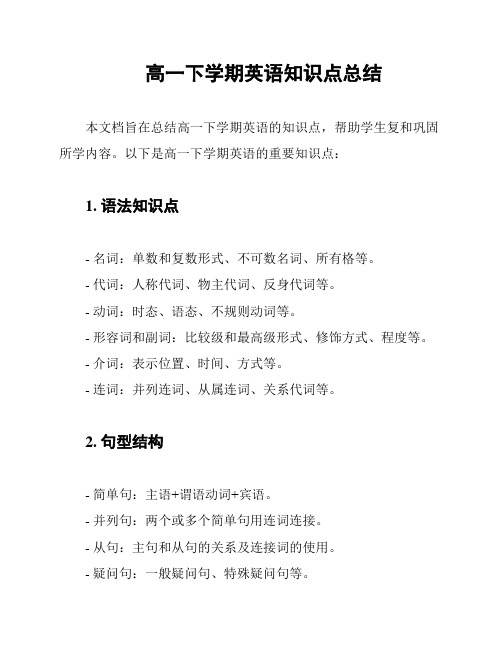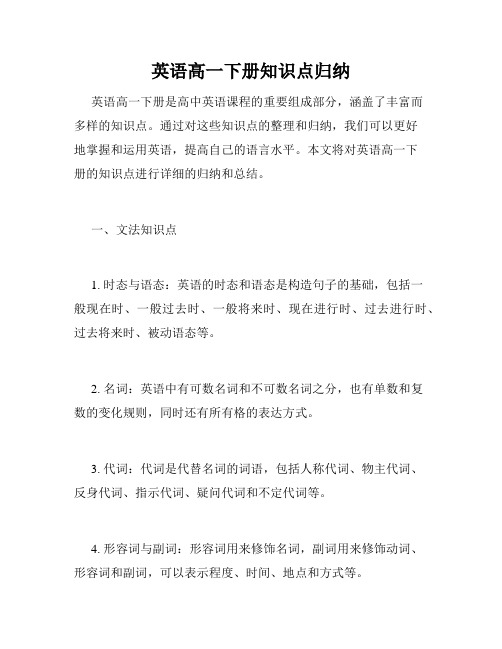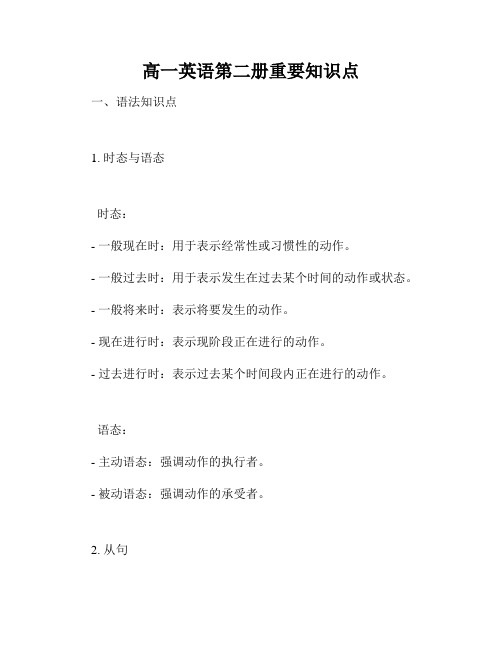高一英语下册知识点归纳:语法和词汇知识
高一英语下半年知识点归纳

高一英语下半年知识点归纳随着高一学年的进展,下半年对于英语学习来说显得尤为重要。
在这个学期,学生们要更深入地学习英语,并掌握一些更为复杂的语法知识和词汇。
以下将对高一英语下半年的知识点进行归纳和总结,帮助大家更好地理解和掌握。
一、时态和语态掌握正确的时态和语态是英语学习的基础。
在高一下半年,我们需要继续学习不同时态的使用和区别,如一般现在时、过去时、将来时等。
此外,学习被动语态也是必不可少的一部分,我们需要理解其用法及其与主动语态的区别。
二、从句和状语从句从句在英语中起着重要的作用,它可以在句子中充当名词、形容词或副词的角色。
下半年,我们需要继续学习不同类型的从句,如名词性从句(主语从句、宾语从句、表语从句)、定语从句和状语从句。
要注意从句的引导词和从句的位置,以及与主句之间的逻辑关系。
三、短语和固定搭配在下半年,我们需要进一步扩充自己的词汇量,并学习一些常用的短语和固定搭配。
这些短语和搭配可以丰富我们的表达方式,使我们的英语更加地道和流利。
比如,常用的情态动词短语(如can't help but),常用的介词短语(如in addition to)等等。
四、阅读技巧和写作技巧在高一下半年,我们需要通过大量的阅读来提高自己的阅读理解能力。
同时,我们需要掌握一些阅读技巧,包括找主题句、关键词、上下文推测等。
此外,写作也是我们需要重点加强的技能之一。
我们应该学会如何组织文章结构、运用适当的连接词,使自己的写作更具有条理性和逻辑性。
五、口语表达和听力训练英语学习的最终目标是能够流利地听说读写,因此在下半年,我们也需要注重口语表达和听力训练。
我们可以通过模仿和练习英语口语,提高自己的口语表达能力。
同时,定期进行听力练习,尤其是听力考试中的各种题型,以提高自己的听力水平。
六、语法细节和固定搭配除了基本的语法知识外,下半年我们还需要掌握一些语法细节和固定搭配。
比如,不同动词后接的介词、非谓语动词的用法、情态动词的用法,以及一些固定的词组和搭配。
高一下学期英语知识点总结

高一下学期英语知识点总结
本文档旨在总结高一下学期英语的知识点,帮助学生复和巩固所学内容。
以下是高一下学期英语的重要知识点:
1. 语法知识点
- 名词:单数和复数形式、不可数名词、所有格等。
- 代词:人称代词、物主代词、反身代词等。
- 动词:时态、语态、不规则动词等。
- 形容词和副词:比较级和最高级形式、修饰方式、程度等。
- 介词:表示位置、时间、方式等。
- 连词:并列连词、从属连词、关系代词等。
2. 句型结构
- 简单句:主语+谓语动词+宾语。
- 并列句:两个或多个简单句用连词连接。
- 从句:主句和从句的关系及连接词的使用。
- 疑问句:一般疑问句、特殊疑问句等。
3. 阅读理解
- 阅读技巧:快速浏览、寻找关键词、推测词义等。
- 阅读题型:细节理解题、推理判断题、词义猜测题等。
4. 写作技巧
- 写作结构:引言、正文、结论等。
- 写作方法:描述、议论、说明、观点相反等。
- 写作语言:使用各种连接词和句型。
以上只是高一下学期英语知识点的简要总结,学生们还需要通过课本和练习册来进行更深入的练习和巩固。
希望本文档对学生们的英语学习有所帮助。
高一英语书下册知识点总结

高一英语书下册知识点总结高一英语书下册是学习英语的重要教材之一,内容涵盖了语法、阅读、写作等各个方面的知识点。
本文将对这本教材中的主要知识点进行总结。
一、语法知识点汇总本册的语法部分主要包括动词时态、语态、非谓语动词、动词的一般和完成式等内容。
其中,动词时态是学习英语中最基本的知识点之一。
它包括一般现在时、一般过去时、一般将来时等。
了解这些时态的用法,有助于正确表达动词的时间和状态。
另外,语态也是本册中的重要内容。
它包括主动语态和被动语态。
学习语态的目的是使句子更加灵活,表达更加准确。
了解被动语态的用法,可以帮助我们理解和翻译复杂的句子。
非谓语动词也是高一英语书下册的重要知识点之一。
非谓语动词包括动词不定式、动名词和现在分词。
它们可以作主语、宾语、表语、定语等不同的句子成分,用法上需要注意。
二、阅读理解高一英语书下册的阅读理解部分包括不同类型的文章,如记叙文、说明文、议论文等。
通过阅读这些文章,学生可以提高语言理解能力和阅读技巧。
在阅读理解中,学生需要注意正确理解文章的主旨和细节信息。
同时,也要学会根据上下文推断词义和句义。
通过多读多练,提高自己的阅读速度和准确性。
三、写作技巧本册中的写作部分主要包括书面表达和写作素材的积累。
书面表达包括信件、卡片、邀请函等不同形式的写作。
学生可以通过这些练习提高自己的写作能力和表达能力。
在写作时,学生需要注意语言的准确性和流畅性。
同时,也要注意逻辑性和连贯性,使文章具有清晰的结构和层次感。
四、听力技巧高一英语书下册的听力部分涵盖了各种不同类型的听力材料,如对话、独白、访谈等。
通过听力练习,学生可以提高自己的听力能力和听辨能力。
同时,也可以加强对各种语音和语调的理解。
在听力过程中,学生要注意提高听力的速度和准确性。
同时,也要学会根据上下文和语境推断出相关信息。
综上所述,高一英语书下册包含了多个知识点,包括语法、阅读、写作和听力等方面。
通过学习这本教材,学生可以提高自己的英语能力和综合运用能力。
高一下册英语知识点汇总

高一下册英语知识点汇总在高一下学期的英语学习中,我们接触到了许多重要的知识点。
以下是对这些知识点的汇总,希望能够帮助大家更好地学习和复习。
一、语法知识点1. 时态:包括一般现在时、一般过去时、一般将来时等。
在句子中要根据具体语境选择正确的时态。
2. 从句:包括主语从句、宾语从句、定语从句和状语从句等。
在使用从句时要注意从句与主句之间的关系和从句的引导词的选择。
3. 被动语态:要根据句子的时态和语态形式变换动词的形式。
被动语态的结构为“be + 过去分词”。
4. 并列连词:包括and、but、or、so等。
要根据句子的意思和逻辑关系正确选择并列连词。
二、词汇知识点1. 同义词和反义词:要学习一些常见的同义词和反义词的用法,以提高词汇量和丰富表达方式。
2. 词组搭配:要注意一些常用的词组搭配,如“take part in”、“look forward to”等。
这些固定搭配在日常英语交流中非常常见。
3. 常用短语和习惯用语:学习一些常用的短语和习惯用语,如“as a matter of fact”、“in the meantime”等。
这些短语和习惯用语可以提高语言的地道性。
三、阅读知识点1. 阅读理解:要学会快速阅读并理解文章的主旨和要点。
可以通过多读一些英文短文和文章,提高阅读理解的能力。
2. 阅读策略:要学会使用一些阅读策略,如扫读、略读、精读等。
不同的阅读策略适用于不同的阅读目的和要求。
3. 词义推测:要学会通过上下文和词的词性等信息推测词义。
这对于提高阅读能力和扩大词汇量非常有帮助。
四、写作知识点1. 写作结构:要学会写作的基本结构,包括引言、正文和结论等。
在写作时要注意段落的连接和过渡。
2. 表达方式:要学会使用一些丰富多样的表达方式,如比喻、引用等。
这样可以使文章更生动有趣。
3. 语法和拼写:要注意语法和拼写的准确性。
写作时要多注意句子的主谓一致、动词时态等方面的正确使用。
以上是高一下册英语学习中的一些重要知识点的汇总。
高一英语知识点下册

高一英语知识点下册下面是高一英语下册的知识点总结,旨在帮助同学们复习和巩固所学的知识。
一、语法知识点1. 时态a) 一般现在时:用于描述经常性的动作、习惯等。
b) 现在进行时:表示现在正在进行的动作。
c) 一般过去时:表示过去发生的动作或状态。
d) 过去进行时:表示过去某一时间点正在进行的动作。
e) 将来时:表示将来要发生的动作或存在的状态。
f) 过去将来时:表示过去某个时间点之前将要发生的动作。
2. 名词a) 可数名词和不可数名词:可数名词有单数和复数形式,不可数名词只有单数形式。
b) 特殊名词的复数形式:例如以-y结尾的名词,将y改为i 加es。
c) 名词所有格的表示:单数名词加’s;复数名词以s结尾加’。
d) 可数名词的数量表达:a/an, some, many, few, a few等。
3. 代词a) 主格代词:用作句子的主语。
b) 宾格代词:用作句子的宾语。
c) 物主代词:表示所有关系。
d) 反身代词:表示动作反射到主语自身。
e) 关系代词:用于引导定语从句。
f) 不定代词:表示不确定或泛指。
4. 形容词和副词a) 形容词和副词的比较级和最高级形式。
b) 形容词修饰名词时的用法。
c) 副词修饰动词、形容词和副词时的用法。
二、阅读理解1. 阅读技巧:快速浏览、划线关键词、理解上下文等。
2. 阅读策略:主旨题、细节题、推理题、态度观点题等。
3. 填空题技巧:通读全文、根据上下文语境填空。
三、写作技巧1. 基本写作句型:a) 主+谓+宾:She likes apples.b) 主+谓+宾+宾补:They elected him monitor.c) 主+谓+宾+宾语补足语:We found the painting beautiful.2. 写作连词的使用:and, but, so, because, although, however等。
3. 描述事件或经历:a) 使用一般过去时态来叙述过去的事件。
英语高一下册知识点归纳

英语高一下册知识点归纳英语高一下册是高中英语课程的重要组成部分,涵盖了丰富而多样的知识点。
通过对这些知识点的整理和归纳,我们可以更好地掌握和运用英语,提高自己的语言水平。
本文将对英语高一下册的知识点进行详细的归纳和总结。
一、文法知识点1. 时态与语态:英语的时态和语态是构造句子的基础,包括一般现在时、一般过去时、一般将来时、现在进行时、过去进行时、过去将来时、被动语态等。
2. 名词:英语中有可数名词和不可数名词之分,也有单数和复数的变化规则,同时还有所有格的表达方式。
3. 代词:代词是代替名词的词语,包括人称代词、物主代词、反身代词、指示代词、疑问代词和不定代词等。
4. 形容词与副词:形容词用来修饰名词,副词用来修饰动词、形容词和副词,可以表示程度、时间、地点和方式等。
5. 介词与介词短语:介词用来表示时间、地点、原因、方式等关系,常与名词、代词或动名词连用。
6. 动词:动词是句子的谓语,包括动词的基本形式、不定式、进行时态、完成时态和虚拟语气等。
7. 并列连词与从属连词:并列连词用来连接并列的词语、词组或句子,如and, or, but等;从属连词用来引导从句,如because, although, when等。
8.句子类型与句法关系:英语中的句子包括陈述句、疑问句、祈使句和感叹句,句子之间还存在主谓关系、主从关系和从属关系等。
二、阅读技巧与方法1. 基本阅读技巧:包括找关键词、推测词义、理解句子结构、捕捉主旨大意和掌握文章结构等。
2. 阅读理解题型:主要有选择题、判断题、填空题、表格题和配对题等,需要根据文章内容选择正确答案。
3. 阅读速度与阅读量:通过提高阅读速度和增加阅读量,可以提高自己的阅读能力和理解能力。
4. 阅读材料的选择:可以选择感兴趣的话题和内容进行阅读,以便提高阅读的主动性和积极性。
三、写作技巧与方法1. 写作结构与段落安排:写作时需要注意段落的分配和过渡词的使用,使文章结构清晰、层次分明。
高一下英语必考知识点总结

高一下英语必考知识点总结英语是我们学习的重要科目之一,在高中英语学习中,掌握必考知识点对于我们提高听说读写能力、取得好成绩至关重要。
下面是我为大家总结的高一下学期英语必考知识点,希望能够对同学们的学习有所帮助。
1. 语法知识点高一下英语的语法知识点主要包括时态、语态、虚拟语气、感叹句、定语从句、状语从句等。
时态:基本时态的用法和句型转换,包括一般现在时、一般过去时、一般将来时、现在进行时、过去进行时、过去将来时等。
语态:主动语态和被动语态的用法和句型转换,注意被动语态的时态与主动语态的对应关系。
虚拟语气:虚拟语气的用法,包括表示与事实相反的虚拟条件句、建议、命令、要求和感叹等。
感叹句:常用的感叹句结构和常见的感叹词的用法,如:How + adj. / adv. + 主语 + 动词!What + adj. / adv. + 名词 + 主谓结构!定语从句:定语从句的引导词、关系代词和关系副词的使用,以及定语从句的修饰和被修饰的要点。
状语从句:时间、地点、原因、方式、条件等不同类型状语从句的引导词和用法,以及状语从句在复合句中的位置和结构。
2. 阅读技巧高一下英语阅读理解题主要包括选择题、填空题和判断题。
在做阅读理解题时,需要掌握以下技巧:仔细阅读题目:在做题前先读题目,了解问题的要求,然后带着问题去阅读文章,有针对性地搜索答案。
留意关键词:阅读文章时要留意关键词,如数字、时间、地点、人物等,这些词汇通常与问题的答案相关。
注意文章结构:理解文章的大意和结构,弄清楚文章的主题、段落的层次和逻辑关系,有助于准确回答问题。
划掉干扰选项:在选择题中,划掉明显不符合文章要求的干扰选项,缩小答案范围,提高正确率。
3. 写作技巧高一下英语写作题主要包括短文改错、书面表达等。
在写作方面,需要注意以下技巧:语法错误改正:仔细审题,找出句子中的错误,并根据语法规则进行改正,注意主谓一致、时态一致等问题。
合理运用词汇和句型:写作中注意使用恰当的词汇和句型,使句子更加流畅和丰富,增加写作的分数。
高一英语第二册重要知识点

高一英语第二册重要知识点一、语法知识点1. 时态与语态时态:- 一般现在时:用于表示经常性或习惯性的动作。
- 一般过去时:用于表示发生在过去某个时间的动作或状态。
- 一般将来时:表示将要发生的动作。
- 现在进行时:表示现阶段正在进行的动作。
- 过去进行时:表示过去某个时间段内正在进行的动作。
语态:- 主动语态:强调动作的执行者。
- 被动语态:强调动作的承受者。
2. 从句- 名词性从句:可以充当主语、宾语、或表语。
- 定语从句:修饰名词或代词。
- 状语从句:表示时间、条件、原因、目的等。
3. 并列连词与从属连词- 并列连词:连接同等重要的词、短语、句子,如and、but、or等。
- 从属连词:连接主从复合句,如because、although、if等。
4. 虚拟语气- 虚拟条件句:表示与现实相反或不可能实现的假设。
- 虚拟语气在宾语从句中的运用:表示对未来动作的想象、猜测或对过去情况的虚构。
二、阅读技巧1. 阅读理解- 通读全文:先快速浏览全文,了解文章的大意和结构。
- 理解段落关系:理解各段之间的逻辑关系,把握文章的脉络。
- 注意细节信息:找出文章中的关键词、数字、时间等细节信息,帮助回答问题。
- 推理推断:根据文章中的线索进行推理推断,补充或推导出未明确提及的信息。
- 答案定位:根据题目要求,在文章中迅速定位答案所在的段落。
- 选项排除:排除与题目不相符的选项,缩小答案范围。
2. 阅读技巧- 词汇理解:根据上下文推断生词的意思。
- 正确发音:对单词的正确发音进行练习。
- 快速阅读:提高阅读速度和理解能力,培养整体把握文章的能力。
- 划线标记:在阅读过程中划线,标记出重点信息,有助于后期复习和查找。
三、写作技巧1. 作文结构- 开头:引入话题背景,引起读者兴趣。
- 主体:逐步展开观点、论据,进行论述。
- 结尾:总结全文,提出建议或展望未来。
2. 句子结构- 主谓一致:主语与谓语动词的单复数要一致。
- 1、下载文档前请自行甄别文档内容的完整性,平台不提供额外的编辑、内容补充、找答案等附加服务。
- 2、"仅部分预览"的文档,不可在线预览部分如存在完整性等问题,可反馈申请退款(可完整预览的文档不适用该条件!)。
- 3、如文档侵犯您的权益,请联系客服反馈,我们会尽快为您处理(人工客服工作时间:9:00-18:30)。
高一英语下册知识点归纳:语法和词汇知识高一英语下册知识点归纳:语法和词汇知识堂4分钟练习Ⅰ语法和词汇知识1T pretended ______ it;but in fat,he ne it ver ellAnt t listen tBnt t hear abutnt t have heard abutDnt t be listening t解析:pretend nt t have dne假装没做过某事;pretend t be ding sth 假装正在做某事;pretend t d sth假装做某事。
由he ne it ver ell可知,应选项。
答案:2an peple in hina have never dreaed f ______ a hane fr the t learn t drive after their retireentAbeing Btherethere t be Dthere being解析:介词后用名词、代词或者动名词,所以there be句型要用there being的形式。
答案:D3I an’t give sn the leading psitin______,he is t ung;sendl,I ant rSith t have the bAAfter all BFr exapleIn the end DT begin ith解析:after all毕竟,终究;fr exaple例如;in the end最后;t begin ith 首先。
根据句意知应选D项。
答案:D4e ere ver tired and aled ith diffiult,but e gt he ______Aat all Bafter allabve all Din all解析:“我们已疲惫不堪,行走艰难,但我们毕竟到家了。
” after all此处表示“毕竟”之意。
答案:BHe aes abut $1000 ever ee,uh ______ is spent n bsAf hih Bin thatang hih Df it解析:定语从句补充完整为:uh f the ne is spent n bs,所以用f hih 引导这个定语从句。
答案:A6Se advertiseents,lie the envirnental prtetin advertiseent ______ t ur nsiene r ur desire t be rth itizensAadapt Battahappeal Dadust解析:adapt“适应;改编”;attah“缚,系”;appeal “恳求;呼吁;有感染力;吸引”;adust“调节,适应”。
句意:一些广告,比如环保广告,唤起我们成为受尊敬市民的良知或欲望。
由句意可知答案为项。
答案:7e paid ______ ash in the hpe that e an get 1% ______Aith;aunt Bin;hargeb;unt Din;disunt解析:in ash用现金;b he用支票;aunt账户;harge费用,收费;unt 数,计数;disunt打折,折扣。
句意:我们用现金支付,希望能得到1%的折扣。
答案:D8untless peple in develping untries n lnger suffer alnutritin______,pvert reains a prble rldideAhile BNeverthelessBesides DIn additin解析:hile“而,却”,表示两者之间的对比;nevertheless“然而,不过”;besides“此外”;in additin“另外”。
句意:无数的发展中国家的人们不再营养不良。
然而,贫穷仍是一个存在于全球范围内的问题。
由句意可知,只有B项符合题意。
答案:B9A health are pret an prvide treatent ______ half the st r less,______the needs f the patientAat;relied n Bith;reling nat;reling n Db;relies n解析:at st“以成本价”;at half the st“以半价”;rel n 后接了宾语“the needs f the patient”,而句中已有了谓语an prvide,所以rel n 必须用非谓语动词的形式;treatent和rel n之间是主动关系,应用现在分词的形式。
答案:10Big panies in Geran generall ______ the eur,hile sall anufaturers are nervus;big bans are in favr;sall nes are againstAnsist f Bplain fapprve f Ddrea f解析:nsist f组成,构成;plain f抱怨;apprve f赞成;drea f梦想。
句意:在德国大公司普遍赞同欧元,而小手工业者则很不安;大银行支持,而小银行则反对。
根据句意知选项。
答案:Ⅱ句子翻译1咱们得把好苹果拣出,同坏的分开。
(srt ut)___________________________________________________________ _____________答案:e ust srt ut the gd apples fr the bad nes2他的各科成绩均佳,尤以英语为好。
(abve all)___________________________________________________________ _____________答案:He des ell in all his subets but,abve all,in English3你可以指望我帮助你。
(rel n)___________________________________________________________ _____________答案:u an rel n e t help u4你们要按照他们的方法去做试验。
(perfr)___________________________________________________________ _____________答案:u shall perfr the experient the a the d科研工作要有耐心和奉献精神。
(devtin)___________________________________________________________ _____________答案:Patiene and devtin are essential t sientifi researh rⅢ完形填空Eveln Glennie as the first lad f sl perussin in StlandIn an intervie,she realled h she beae a perussin slist(打击乐器独奏演员) in spite f her disabilit“Earl n I deided nt t all the __1__ f thers t stp e fr being a usiianI gre up n a far in nrtheast Stland and began __2__ pian lessns hen I as eightThe lder I gt,the re passin(酷爱) fr usi greBut I als began t graduall lse __3__Dtrs nluded that the nerve daage as the __4__ and b age telve,I as pletel deafBut lve fr usi never ____ e”“ __6__ as t bee a perussin slist,even thugh there ere nne at that tieT perfr,I __7__ t hear usi differentl fr thersI pla in sting feet and an __8__ the pith f a nte(音调高低) b the vibratins(振动) I feel thrugh bd and thrugh __9__ entire sund rld exists b aing use f alst ever __10__ that I have”“I as __11__ t be assessed as a usiian,nt as a deaf usiian,and I applied t the faus Ral Aade f usi in LndnN ther deaf student had __12__ this befre and se teahers __13__ adissinBased n perfrane,I as __14__ aditted and ent n t __1__ ith the aade’s highest hnrs”“After that,I established self as the first full&sh;tie sl perussinistI __16__ and arranged a lt f usial psitins sine __17__ had been ritten speiall fr sl perussinists”“I have been a slist fr ver ten ears__18__ the dtr thught I as ttall deaf,it didn’t __19__ that passin uldn’t be realizedI uld enurage peple nt tall theselves t be __20__ b thersFll ur passin;fll ur heartThe ill lead u t the plae u ant t g”1Anditins Bpininsatins Dreendatins解析:早些时候,她不允许别人有阻止她学习音乐的想法。
nditin“条,状况”;pinin“观点,想法”;atin“举止,举动”;reendatin“推荐,介绍”。
